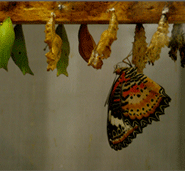But with the flick of a spoon, it separates, maintaining the integrity of each morsel, too proud, difficult to melt into the mass.
So I prefer ambemohar. I like its thick, juicy grains that only plump up further with overcooking. I like the rich, starchy cake it forms when steamed.
(I never drain that starch away, even though I read in Femina that it will all end up on my hips.)
I like the way it soaks up whatever I add to it, the paste it turns into so I can eat it with my hands. I like that it sticks to my fingers and the sides of my lips, and even on the edges of my fingernails. I use my tongue to roll it around my mouth and barely chew before swallowing.
Smriti Dixit’s Food & Faith chronicles a similar obsession with rice. Not just its flavors and textures, but the scent that it momentarily leaves behind.
(My mother told me that rice would never rise to a boil on the stove if you watched it. She said that it was a private process, a sort of war between the elements of fire and water. Rice actually had very little to do with it. The cooking was just the byproduct of the lovemaking or bloodshed, however you wanted to think of it.)
In an attempt to capture the innocent and illicit pleasure of a food so common and comforting, Dixit studied the art of perfumery to capture the smell of cooking rice. The scent lingers for a moment and then gives way to the smoky incense of its undertones.
(Ambemohar is so good you can even eat it plain. Or perhaps with a green chili and some lime squeezed on top. Avoid drinking water in case it dilutes the frenzy in your mouth.)
I wonder what would happen if one wore the perfume out on a date with a man. Perhaps it would smell as though I had been in the kitchen all day. In the house alone.
Or it would it have the opposite effect. It might conjure scenes of a pressure cooker blowing its whistle, and a table full of food. Would it stir some imagined memories, of a house that he never really had, of a mother he couldn’t actually remember, of a meal he had tried to skip?
(I bet the latter would be true, that the scent of domestic contentment would have them lined around the corner with dreams of a hot meal and a waiting wife.)
Avni Doshi is a writer, curator and art historian living between London, New York and Mumbai.
Smriti Dixit is an artist living and working in Mumbai.








